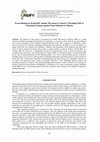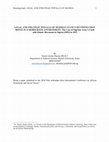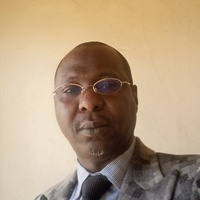Teaching Documents by Aminu Hayatu Ph.D.

The objective of this study is to represent the Islamic Movement in Nigeria (IMN) as a group whic... more The objective of this study is to represent the Islamic Movement in Nigeria (IMN) as a group which has shifted its paradigm from Islamism to realpolitik as a strategy to checkmate the growing influence of its Sunni counterpart in the competitive Nigerian political arena. This is however to debunk the widely held on conviction by Nigerians including the Nigerian state itself that, the IMN (as it once claimed), is a group which does not recognize the legitimacy, authority and constitution of the Nigerian state and which seeks to achieve political revolution from secular to Islamic political system in Nigeria. Casting IMN in a contrary light, the study uses a combination of interviews and literature review as sources of primary and secondary data respectively, and, Political Process Theory (PPT) as a theoretical guide, to find that the IMN has by way of silent penetration into the Nigerian politics, civil service and governance process, evolved to gradually move away from its earlier position of Islamism perpetrated especially during its earlier periods of Islam Only (IO), in the hope of matching, counterbalancing and check-mating the established influence of its major rival group-the Sunni, which is generally believed to have dominated political affairs and government positions in Nigeria. This gradual paradigm shift strategy or what is referred to in this paper as political Taqiyyah from Islamism to Realpolitik is concluded to be a silent revolutionary strategy embarked by the IMN in view of increasing political relevance, popularity and advantage in the Nigerian competitive political landscape.
General Studies Unit Bayero University Kano, 2020
Introductory background Contemporary peacekeeping processes are at different levels; global, regi... more Introductory background Contemporary peacekeeping processes are at different levels; global, regional, subregional or even national. It focuses on different aspects of peace processes. However, in Africa, due to the nature of the high magnitude of conflicts, peacekeeping operations are usually employed. In fact, in the West African region, due to the recurrence of conflicts, since 1992 to date the region has experienced more than ten (10) peacekeeping operations in different countries. (Abiew, 2003). It is imperative to understand that, peacekeeping operations do not happen out of a vacuum, they are usually undertaken as a response to conflicts whose magnitude and cost have grown to become high in terms of loss of lives and properties.
Books by Aminu Hayatu Ph.D.

Book Chapter, 2021
Nigeria has one of the most corrupt defense and security sectors in the world, indeed, this vicio... more Nigeria has one of the most corrupt defense and security sectors in the world, indeed, this vicious circle of corruption proves so intricate that those agents of the Nigerian state whose responsibility it is to provide and ensure security to the people, remove or deter obstacles to it, are the ones who turn out initiating and abetting the corruptionMathew Page (2018). Considering the rise in the spate of criminal activities in geopolitical regions, insecurity in Nigeria has risen sharply in the last few years. In every almost all the states of the country, there is either one kind of crime or the other. Northern Nigeria and indeed the North West sub-region is one of the hottest crime zones now. Varin & Onuoha, (2020). For almost two decades now, various security situation reports Achumba, I. C., Ighomereho, & Akpor-Robaro, (2013) have corroborated on the fact that some states of Northern Nigeria-particularly Zamfara, Kaduna, Niger, Sokoto, Kebbi, and Katsina have become hot zones of either kidnapping or banditry with enormous consequences of loss of thousands of lives and property. It has been estimated that about 21 million people living in these states have been exposed to insecurity from banditry activities (ACAP). These threats have contributed to Nigeria's global ranking as the 7th in 2017, 6th in 2018, and 2019 most insecure nation in the globe (EVM, 2018), (EVM, 2018), (EVM, 2018).
This is in addition to the existential threats of organized crimes; Nigeria's borders; climate change; communal and ethnoreligious conflicts; pastoralists and farmers conflicts; governance issues; poverty; the proliferation of small arms and light weapons; illegal migration; and economic challenges. Etim, Duke, & Ogbinyi Jr, (2017), Muhammed, Salihu, & Alhassan, (2018), Akuul, &Shaibume, (2018), Nwangwu, &Enyiazu, (2019), Orkar, Shaminja, & Solomon, (2019), Nnam, Ugwuoke, Njemanze, &Akwara, (2020).These existential threats have been viewed differently in terms of origin, causes, dynamics, or even consequences. Okoli, &Ugwu, (2019) have been made to show the dimension of corruption in the enduring problem. This study as it recognizes these endeavors and their limitations seek to focus on the role that corruption plays in the bid to combat kidnapping and banditry in Nigeria's North-West zone. This is especially because the analysis of corruption in Nigeria generally, Akindele, (2005) has constantly juxtaposed how all sectors of the Nigerian economy and state apparatus are bedeviled by corruption. Mohammed, U. (2013) Ogundiya, (2009). Gire, (1999), Ogbeidi, M. M. (2012), & (Lawal, & Victor, 2012).
Book Chapter, 2020
Introductory background Contemporary peacekeeping processes are at different levels; global, regi... more Introductory background Contemporary peacekeeping processes are at different levels; global, regional, subregional or even national. It focuses on different aspects of peace processes. However, in Africa, due to the nature of the high magnitude of conflicts, peacekeeping operations are usually employed. In fact, in the West African region, due to the recurrence of conflicts, since 1992 to date the region has experienced more than ten (10) peacekeeping operations in different countries. (Abiew, 2003). It is imperative to understand that, peacekeeping operations do not happen out of a vacuum, they are usually undertaken as a response to conflicts whose magnitude and cost have grown to become high in terms of loss of lives and properties.
Conference Presentations by Aminu Hayatu Ph.D.

national conference , 2018
This paper is a partial critique of Abdullahi Mahadi's somewhat anachronistic construction of the... more This paper is a partial critique of Abdullahi Mahadi's somewhat anachronistic construction of the history of IMN in Nigeria through his memo which is widely circulated and referred to since its release to the Kaduna State Judicial Commission of Inquiry (JCI) on the 15th of February 2015. In the paper, Mahadi's foremost among other claims was what he referred to as the introduction of Shiism into Nigeria, were he argued that Shiism was introduced into Nigeria between mid-1970s and mid-1980s, that; it was introduced by one Islamul-Haq in the department of economics Ahmadu Bello University, (ABU) who in connivance with El-Zakzaky lured, indoctrinated and radicalized other students into Shi'ism. Using a combination of in-depth interview and document review as sources of data and, Event History Analysis (EHA), The paper found that one of the dramatis personae (Ibrahim El-Zakzaky) only contacted Shi'ism and became one of its agents in Nigeria beyond his stay within the confines of ABU as a student while the other (Islamul-Haq) is until today never a Shi'ite hence the study unmakes Mahadi's historical construction by concluding that the three chief claims of time, actors and place as well as the methodology used by Abdullahi Mahadi to construct the history of the introduction of Shiism into Nigeria, actually lacked thorough, deep rooted and rigorous investigation, this is by virtue of his aberration of other necessary fragmentary pieces of evidences and reluctance to necessarily employ scientific historiographical procedure which would have helped produce a more deep-rooted, thorough and comprehensive account of the introduction of Shiism in Nigeria.

international conference, 2017
The objective of this study is to represent the Islamic Movement in Nigeria (IMN) as a group whic... more The objective of this study is to represent the Islamic Movement in Nigeria (IMN) as a group which has shifted its paradigm from Islamism to realpolitik as a strategy to checkmate the growing influence of its Sunni counterpart in the competitive Nigerian political arena. This is however to debunk the widely held on conviction by Nigerians including the Nigerian state itself that, the IMN (as it once claimed), is a group which does not recognize the legitimacy, authority and constitution of the Nigerian state and which seeks to achieve political revolution from secular to Islamic political system in Nigeria. Casting IMN in a contrary light, the study uses a combination of interviews and literature review as sources of primary and secondary data respectively, and, Political Process Theory (PPT) as a theoretical guide, to find that the IMN has by way of silent penetration into the Nigerian politics, civil service and governance process, evolved to gradually move away from its earlier position of Islamism perpetrated especially during its earlier periods of Islam Only (IO), in the hope of matching, counterbalancing and check-mating the established influence of its major rival group-the Sunni, which is generally believed to have dominated political affairs and government positions in Nigeria. This gradual paradigm shift strategy or what is referred to in this paper as political Taqiyyah from Islamism to Realpolitik is concluded to be a silent revolutionary strategy embarked by the IMN in view of increasing political relevance, popularity and advantage in the Nigerian competitive political landscape.

International Conference, 2018
The objective of this paper is to apply the logic of Democratic principles and strategy as a basi... more The objective of this paper is to apply the logic of Democratic principles and strategy as a basis to critically analyze the Nigerian state’s securitization moves as a response to the challenge of the Islamic
Movement of Nigeria (IMN). Since the return of democracy in Nigeria in 1999, after different prolonged military interregnums, the Nigerian state has kept experiencing various kinds of security challenges from the activities of different groups and movements such as MENDS, Boko Haram, Niger Delta Avengers, etc. Such has made the polity and its democratic system suffer setbacks
arising from its inability to appropriately and effectively handle such security challenges. The latest clash between the IMN and the Nigerian state or its Army apparatus in Zaria on the 12th of December 2015 and an earlier one on the 25th of July, 2014, which led to the killing of hundreds of members of the former, is a full pledge problem indicative of the fact that something is wrong with the securitization approach of the Nigerian state on internal security challenges. Using interviews and literature reviews as sources of primary and secondary data, the research concludes that the Nigerian state’s use of Army apparatus as excessive and unproportional force to respond to the civil challenge of the IMN, is not only democratically unconstitutional and therefore illegal, but also strategically unwise. The paper recommends among others solutions, Grand Strategic (soft) Approach, i.e. following due, legal, and democratic processes in handling insecurity problems, empowerment and equipment of civil and police security forces as the legitimate agencies to handle civil issues vis-a-vis discouraging the use of Army apparatus in civil matters except where absolutely necessary, and putting in place a sound and vibrant socio-economic and political that will effectively prevent radical groups from taking advantage of political opportunities and mobilizing structures to the detriment of the state.

International Conference, 2018
The essence of this paper is not to discuss or analyze Big Data, rather, to highlight the key cha... more The essence of this paper is not to discuss or analyze Big Data, rather, to highlight the key challenges that the Big Data analysis approach poses for social science qualitative research methodology and to propose the way forward; where sampling technique and sampling quality is equated with size and the claim that we can represent all through any data set, as represented by the formula n=all. This is considering the fact that in recent times, the dynamism and complexity of the field of social science vis-à-vis the growing debate and controversy on the application of Big Data and its analytical approaches call for serious interrogation. Using the documentary review as a source of qualitative data, the study found that the equation of data sampling technique and sampling quality with data size is a myth rather than reality because, unlike objects, human beings as subjects of social science research are by their very nature dynamic and complex so may not always be adequately represented through any data set hence the tendency for a biased conclusion or research outcome. Therefore the solution lies in the fact that rather than getting more data, it is better to combine large-scale data with an understanding of the sampling process in order to correct biases that might affect this process. This will help to correct the highly non-representative samples that would have been mistakenly collected. Similarly, using what may be regarded as Post-stratification correction, highly non-represented samples of Big Data can be corrected using data obtainable from a sampling process; this way data comes from a sampling process no matter how much of it we collect. The research is timely because it contributes to the recently provoked debate on the evolving concept and controversy of big data as a social science research method.
Key Words: Big Data, Data Science, Algorithm, n=all, Qualitative Data, Data bias.
Papers by Aminu Hayatu Ph.D.

The objective of this study is to represent the Islamic Movement in Nigeria (IMN) as a group whic... more The objective of this study is to represent the Islamic Movement in Nigeria (IMN) as a group which has shifted its paradigm from Islamism to realpolitik as a strategy to check-mate the growing influence of its Sunni counterpart in the competitive Nigerian political arena. This is however to debunk the widely held on conviction by Nigerians including the Nigerian state itself that, the IMN (as it once claimed), is a group which does not recognize the legitimacy, authority and constitution of the Nigerian state and which seeks to achieve political revolution from secular to Islamic political system in Nigeria. Casting IMN in a contrary light, the study uses a combination of interviews and literature review as sources of primary and secondary data respectively, and, Political Process Theory (PPT) as a theoretical guide, to find that the IMN has by way of silent penetration into the Nigerian politics, civil service and governance process, evolved to gradually move away from its earlier ...
Asian journal of multidisciplinary studies, 2017
The essence of this paper is to analyze the evolution of the Islamic Movement in Nigeria based on... more The essence of this paper is to analyze the evolution of the Islamic Movement in Nigeria based on the material contradictions rather reporting of mere events. This approach is uniquely important because it brings out in an analytical manner the conditions, forces, and interests that had influenced the eventual distinct character of each periodic category of the movement’s evolutionary process. This is achieved by the use of interview and literature review as sources of primary and secondary data respectively. Findings of the paper have shown that the IMN that we see today is a final product of a contentious journey of factions, fall outs, splinter groups and break away.

The objective of this study is to represent the Islamic Movement in Nigeria (IMN) as a group whic... more The objective of this study is to represent the Islamic Movement in Nigeria (IMN) as a group which has shifted its paradigm from Islamism to realpolitik as a strategy to check-mate the growing influence of its Sunni counterpart in the competitive Nigerian political arena. This is however to debunk the widely held on conviction by Nigerians including the Nigerian state itself that, the IMN (as it once claimed), is a group which does not recognize the legitimacy, authority and constitution of the Nigerian state and which seeks to achieve political revolution from secular to Islamic political system in Nigeria. Casting IMN in a contrary light, the study uses a combination of interviews and literature review as sources of primary and secondary data respectively, and, Political Process Theory (PPT) as a theoretical guide, to find that the IMN has by way of silent penetration into the Nigerian politics, civil service and governance process, evolved to gradually move away from its earlier ...










Uploads
Teaching Documents by Aminu Hayatu Ph.D.
Books by Aminu Hayatu Ph.D.
This is in addition to the existential threats of organized crimes; Nigeria's borders; climate change; communal and ethnoreligious conflicts; pastoralists and farmers conflicts; governance issues; poverty; the proliferation of small arms and light weapons; illegal migration; and economic challenges. Etim, Duke, & Ogbinyi Jr, (2017), Muhammed, Salihu, & Alhassan, (2018), Akuul, &Shaibume, (2018), Nwangwu, &Enyiazu, (2019), Orkar, Shaminja, & Solomon, (2019), Nnam, Ugwuoke, Njemanze, &Akwara, (2020).These existential threats have been viewed differently in terms of origin, causes, dynamics, or even consequences. Okoli, &Ugwu, (2019) have been made to show the dimension of corruption in the enduring problem. This study as it recognizes these endeavors and their limitations seek to focus on the role that corruption plays in the bid to combat kidnapping and banditry in Nigeria's North-West zone. This is especially because the analysis of corruption in Nigeria generally, Akindele, (2005) has constantly juxtaposed how all sectors of the Nigerian economy and state apparatus are bedeviled by corruption. Mohammed, U. (2013) Ogundiya, (2009). Gire, (1999), Ogbeidi, M. M. (2012), & (Lawal, & Victor, 2012).
Conference Presentations by Aminu Hayatu Ph.D.
Movement of Nigeria (IMN). Since the return of democracy in Nigeria in 1999, after different prolonged military interregnums, the Nigerian state has kept experiencing various kinds of security challenges from the activities of different groups and movements such as MENDS, Boko Haram, Niger Delta Avengers, etc. Such has made the polity and its democratic system suffer setbacks
arising from its inability to appropriately and effectively handle such security challenges. The latest clash between the IMN and the Nigerian state or its Army apparatus in Zaria on the 12th of December 2015 and an earlier one on the 25th of July, 2014, which led to the killing of hundreds of members of the former, is a full pledge problem indicative of the fact that something is wrong with the securitization approach of the Nigerian state on internal security challenges. Using interviews and literature reviews as sources of primary and secondary data, the research concludes that the Nigerian state’s use of Army apparatus as excessive and unproportional force to respond to the civil challenge of the IMN, is not only democratically unconstitutional and therefore illegal, but also strategically unwise. The paper recommends among others solutions, Grand Strategic (soft) Approach, i.e. following due, legal, and democratic processes in handling insecurity problems, empowerment and equipment of civil and police security forces as the legitimate agencies to handle civil issues vis-a-vis discouraging the use of Army apparatus in civil matters except where absolutely necessary, and putting in place a sound and vibrant socio-economic and political that will effectively prevent radical groups from taking advantage of political opportunities and mobilizing structures to the detriment of the state.
Key Words: Big Data, Data Science, Algorithm, n=all, Qualitative Data, Data bias.
Papers by Aminu Hayatu Ph.D.
This is in addition to the existential threats of organized crimes; Nigeria's borders; climate change; communal and ethnoreligious conflicts; pastoralists and farmers conflicts; governance issues; poverty; the proliferation of small arms and light weapons; illegal migration; and economic challenges. Etim, Duke, & Ogbinyi Jr, (2017), Muhammed, Salihu, & Alhassan, (2018), Akuul, &Shaibume, (2018), Nwangwu, &Enyiazu, (2019), Orkar, Shaminja, & Solomon, (2019), Nnam, Ugwuoke, Njemanze, &Akwara, (2020).These existential threats have been viewed differently in terms of origin, causes, dynamics, or even consequences. Okoli, &Ugwu, (2019) have been made to show the dimension of corruption in the enduring problem. This study as it recognizes these endeavors and their limitations seek to focus on the role that corruption plays in the bid to combat kidnapping and banditry in Nigeria's North-West zone. This is especially because the analysis of corruption in Nigeria generally, Akindele, (2005) has constantly juxtaposed how all sectors of the Nigerian economy and state apparatus are bedeviled by corruption. Mohammed, U. (2013) Ogundiya, (2009). Gire, (1999), Ogbeidi, M. M. (2012), & (Lawal, & Victor, 2012).
Movement of Nigeria (IMN). Since the return of democracy in Nigeria in 1999, after different prolonged military interregnums, the Nigerian state has kept experiencing various kinds of security challenges from the activities of different groups and movements such as MENDS, Boko Haram, Niger Delta Avengers, etc. Such has made the polity and its democratic system suffer setbacks
arising from its inability to appropriately and effectively handle such security challenges. The latest clash between the IMN and the Nigerian state or its Army apparatus in Zaria on the 12th of December 2015 and an earlier one on the 25th of July, 2014, which led to the killing of hundreds of members of the former, is a full pledge problem indicative of the fact that something is wrong with the securitization approach of the Nigerian state on internal security challenges. Using interviews and literature reviews as sources of primary and secondary data, the research concludes that the Nigerian state’s use of Army apparatus as excessive and unproportional force to respond to the civil challenge of the IMN, is not only democratically unconstitutional and therefore illegal, but also strategically unwise. The paper recommends among others solutions, Grand Strategic (soft) Approach, i.e. following due, legal, and democratic processes in handling insecurity problems, empowerment and equipment of civil and police security forces as the legitimate agencies to handle civil issues vis-a-vis discouraging the use of Army apparatus in civil matters except where absolutely necessary, and putting in place a sound and vibrant socio-economic and political that will effectively prevent radical groups from taking advantage of political opportunities and mobilizing structures to the detriment of the state.
Key Words: Big Data, Data Science, Algorithm, n=all, Qualitative Data, Data bias.